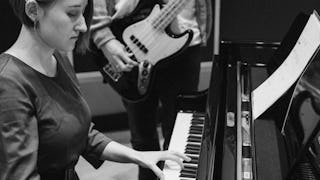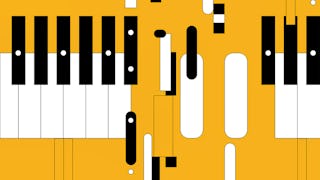Der Kurs wird die Tonkombinationen erforschen, die Menschen als konsonant oder dissonant empfinden, die Skalen, die wir verwenden, und die Emotionen, die Musik auslöst. All dies bietet eine Fülle von Daten zur Erforschung von Musik und auditiver Ästhetik in einem biologischen Rahmen. Analysen von Sprach- und Musikdatenbanken stimmen mit der Idee überein, dass die chromatische Skala (die Menge der Töne, die der Mensch zur Erzeugung von Musik verwendet), Konsonanz und Dissonanz, die weltweiten Vorlieben für einige Dutzend Skalen aus den Milliarden möglicher Skalen und die Emotionen, die Musik in verschiedenen Kulturen hervorruft, alle auf die relative Ähnlichkeit von musikalischen Tonalitäten und den Merkmalen von stimmhafter (tonaler) Sprache zurückzuführen sind. Wie die Phänomenologie der visuellen Wahrnehmung scheinen diese Aspekte der auditiven Wahrnehmung aus der Notwendigkeit entstanden zu sein, mit Sinnesreizen zurechtzukommen, deren physikalische Quellen nicht spezifiziert werden können, was zur Entwicklung einer gemeinsamen Strategie zur Bewältigung dieser grundlegenden Herausforderung geführt hat.

Pflegen Sie Ihre Karriere mit von Experten geleiteten Programmen, arbeitsplatztauglichen Zertifikaten und 10.000 Möglichkeiten zur Weiterentwicklung. Alles für 25 $/Monat, jährlich abgerechnet. Jetzt sparen


Musik als Biologie: Was wir gerne hören und warum

Dozent: Dale Purves
67.701 bereits angemeldet
Bei  enthalten
enthalten
(702 Bewertungen)
Wichtige Details

Zu Ihrem LinkedIn-Profil hinzufügen
7 Aufgaben
Erfahren Sie, wie Mitarbeiter führender Unternehmen gefragte Kompetenzen erwerben.


Erwerben Sie ein Karrierezertifikat.
Fügen Sie diese Qualifikation zur Ihrem LinkedIn-Profil oder Ihrem Lebenslauf hinzu.
Teilen Sie es in den sozialen Medien und in Ihrer Leistungsbeurteilung.

In diesem Kurs gibt es 8 Module
Einführung in die Musik als Biologie
Das ist alles enthalten
1 Video1 Lektüre1 Diskussionsthema
Ein Überblick über die Organisation des menschlichen Gehörs und wie Schallsignale in Klangreize umgewandelt werden.
Das ist alles enthalten
4 Videos2 Lektüren1 Aufgabe4 Diskussionsthemen
Eine Einführung in die Klangqualitäten, die wir wahrnehmen, und wie und warum sich diese Qualitäten von den Informationen in Klangsignalen unterscheiden.
Das ist alles enthalten
5 Videos1 Lektüre1 Aufgabe2 Diskussionsthemen
Eine Diskussion über die Natur der stimmlichen Tonsignale, ihre biologische Bedeutung und ihre Rolle beim Verständnis von Musik.
Das ist alles enthalten
5 Videos1 Lektüre1 Aufgabe3 Diskussionsthemen
Die tonalen Phänomene, die in jeder Musiktheorie erklärt werden müssen, und die verschiedenen Ansätze, mit denen versucht wurde, Antworten zu finden.
Das ist alles enthalten
9 Videos1 Lektüre1 Aufgabe3 Diskussionsthemen
Warum eine kleine Anzahl von Grundskalen in der Musik weltweit verwendet wird und wie ein biologischer Rahmen dies und verwandte Rätsel erklärt.
Das ist alles enthalten
6 Videos1 Lektüre1 Aufgabe3 Diskussionsthemen
Wie Emotionen durch stimmliche Ähnlichkeit in der Musik verschiedener Kulturen vermittelt werden und wie die Sprache einer Kultur und ihre Musik zusammenhängen. Es folgt eine Zusammenfassung der wichtigsten Punkte des Kurses.
Das ist alles enthalten
7 Videos3 Lektüren2 Aufgaben4 Diskussionsthemen
Zusätzliche Demonstrationen und Kommentare von Ruby Froom zu einigen der musikalischen Themen, die im Kurs behandelt werden, sowie ein Glossar und eine Bibliographie für Referenzen.
Das ist alles enthalten
6 Videos16 Lektüren
Dozent

Empfohlen, wenn Sie sich für Grundlagen der Wissenschaft interessieren


Universiteit Leiden


The University of Melbourne


Berklee


California Institute of the Arts
Warum entscheiden sich Menschen für Coursera für ihre Karriere?




Bewertungen von Lernenden
702 Bewertungen
- 5 stars
57,83 %
- 4 stars
24,64 %
- 3 stars
12,10 %
- 2 stars
3,41 %
- 1 star
1,99 %
Zeigt 3 von 702 an
Geprüft am 6. Aug. 2021
It was an incredible experience! Mr. Dale Purves's way of explaining the material is just wonderful! and goes into details which was really helpful!
Geprüft am 17. Mai 2017
Muy completo e interesante, didáctico y muy intuitivo, aprendí demasiado... definitivamente lo recomiendo para aquellos que apenas inician en el mundo de la música!
Geprüft am 21. Sep. 2016
This course has helped me to understand biological psychology of humans towards music. Based on this knowledge i am confident to create music which will seem good to the ears of humans.

Neue Karrieremöglichkeiten mit Coursera Plus
Unbegrenzter Zugang zu 10,000+ Weltklasse-Kursen, praktischen Projekten und berufsqualifizierenden Zertifikatsprogrammen - alles in Ihrem Abonnement enthalten
Bringen Sie Ihre Karriere mit einem Online-Abschluss voran.
Erwerben Sie einen Abschluss von erstklassigen Universitäten – 100 % online
Schließen Sie sich mehr als 3.400 Unternehmen in aller Welt an, die sich für Coursera for Business entschieden haben.
Schulen Sie Ihre Mitarbeiter*innen, um sich in der digitalen Wirtschaft zu behaupten.
Häufig gestellte Fragen
Nein. Durch den Abschluss eines Coursera-Kurses erhalten Sie keine akademischen Credits von Duke. Daher kann Duke Ihnen kein Universitätszeugnis ausstellen. Ihr elektronisches Zertifikat wird jedoch zu Ihrer Accomplishments-Seite hinzugefügt - von dort aus können Sie Ihr Zertifikat ausdrucken oder zu Ihrem LinkedIn-Profil hinzufügen.
Der Zugang zu Vorlesungen und Aufgaben hängt von der Art Ihrer Einschreibung ab. Wenn Sie einen Kurs im Prüfungsmodus belegen, können Sie die meisten Kursmaterialien kostenlos einsehen. Um auf benotete Aufgaben zuzugreifen und ein Zertifikat zu erwerben, müssen Sie die Zertifikatserfahrung während oder nach Ihrer Prüfung erwerben. Wenn Sie die Prüfungsoption nicht sehen:
Der Kurs bietet möglicherweise keine Prüfungsoption. Sie können stattdessen eine kostenlose Testversion ausprobieren oder finanzielle Unterstützung beantragen.
Der Kurs bietet möglicherweise stattdessen die Option 'Vollständiger Kurs, kein Zertifikat'. Mit dieser Option können Sie alle Kursmaterialien einsehen, die erforderlichen Bewertungen abgeben und eine Abschlussnote erhalten. Dies bedeutet auch, dass Sie kein Zertifikat erwerben können.
Wenn Sie ein Zertifikat erwerben, erhalten Sie Zugang zu allen Kursmaterialien, einschließlich der benoteten Aufgaben. Nach Abschluss des Kurses wird Ihr elektronisches Zertifikat zu Ihrer Erfolgsseite hinzugefügt - von dort aus können Sie Ihr Zertifikat ausdrucken oder zu Ihrem LinkedIn-Profil hinzufügen. Wenn Sie die Kursinhalte nur lesen und ansehen möchten, können Sie den Kurs kostenlos besuchen.
Weitere Fragen
Finanzielle Unterstützung verfügbar,

